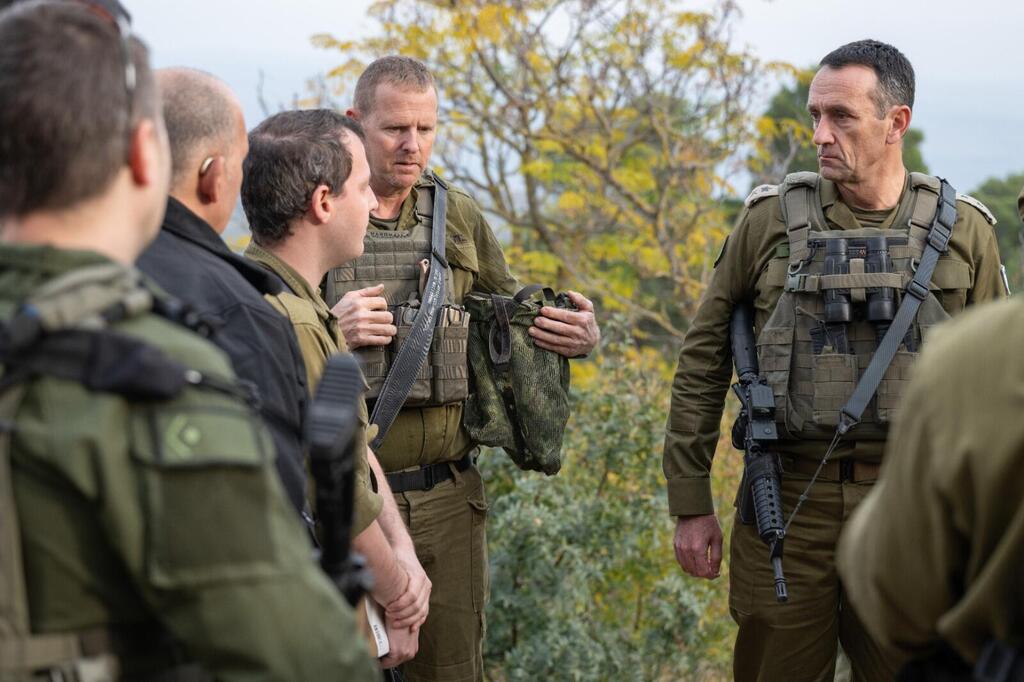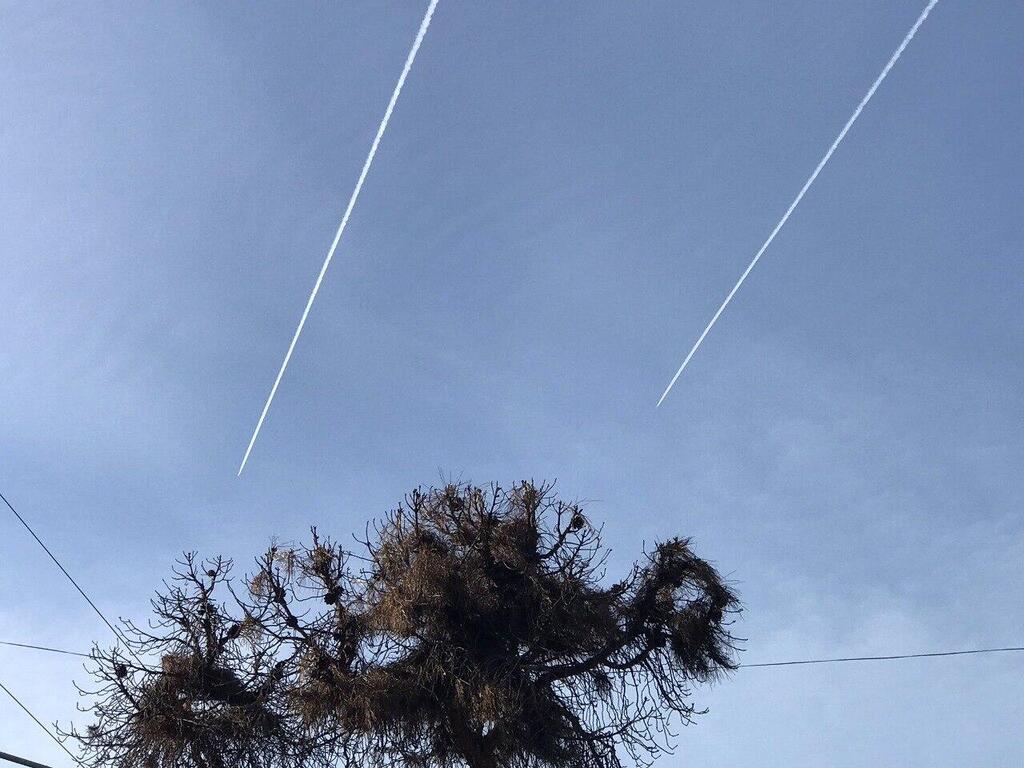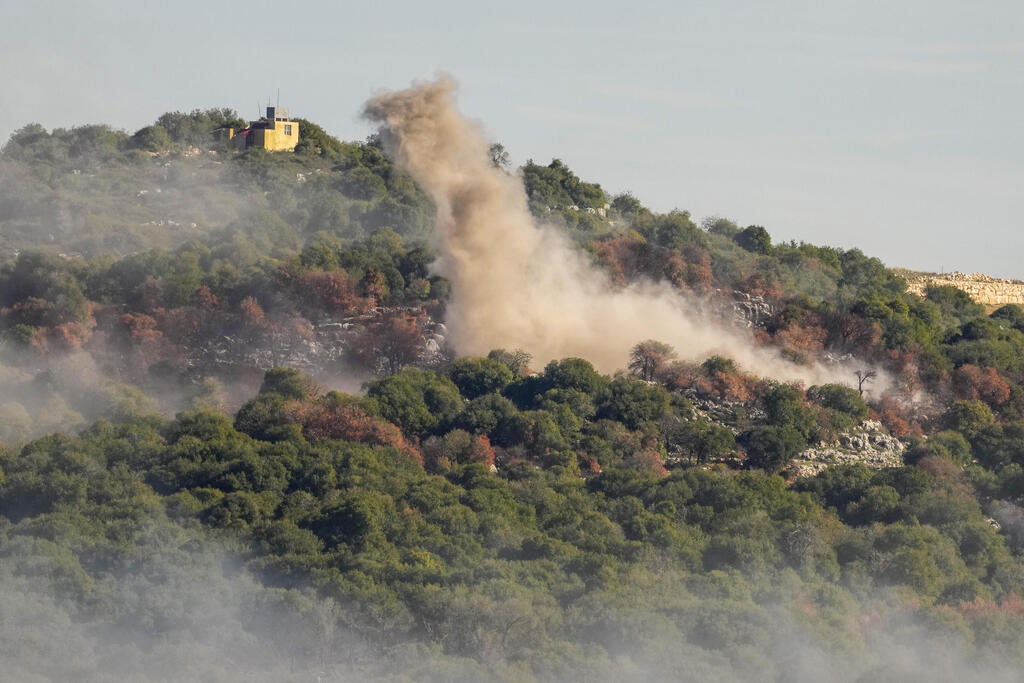Israeli airstrikes in Aitaroun, southern Lebanon
Israeli attacks in southern Lebanon throughout Sunday "resembled the battles of the Second Lebanon War" and were "the most significant since the start of the current conflict," London-based newspaper Al-Sharq Al-Awsat reported.
More stories:
Meanwhile, Hassan Fadlallah, a senior Hezbollah politician, told Reuters that the Israeli air strikes marked a "new escalation" to which the group was responding with new types of attacks while several civilian sources and news outlets in Lebanon reported seeing Israeli fighter jets in the skies of Beirut.
Sunday’s IDF attacks included a large number of towns and villages along the border, such as Aitaroun, Yaroun, Kounine and Bint Jbeil. Sources in southern Lebanon told Al-Sharq Al-Awsat that the intensity of Sunday’s attacks was "the most intense" since the start of the war.
According to these sources, although the attacks have intensified in recent days, the IDF had primarily used artillery and drones, with less reliance on airstrikes, which were employed for areas deeper within Lebanon.
According to sources, there has been a significant shift: the pace of attacks in the sector was heavier, and Israel primarily relied on aerial strikes, reminiscent of the Second Lebanon War when "residential neighborhoods in southern Lebanon were intensively bombed." This evening, an IDF spokesperson updated that "IDF forces attacked a terrorist squad in Lebanese territory earlier today."
However, the sources noted that the frequency of attacks in the area intensified on Sunday, with air raids reminiscent of those of the Second Lebanon War, where "residential areas in southern Lebanon faced intense bombing." Meanwhile, the IDF reported that Israeli forces struck a terrorist cell in Lebanese territory.
Fadlallah added, "The border area pays in blood for all of Lebanon and stands at the forefront to protect the country and support Gaza."
He stated, "All Israeli threats will not affect our people's resolve or change our resistance plan. Israel has failed to impose its agenda on South Lebanon, especially regarding the area south of the Litani River. Israel will not achieve its objectives in Lebanon; we have a strong resistance and a steadfast nation."
Conversely, Hezbollah also expanded its target range, using drones to attack an Israeli post in the western sector of southern Lebanon. The IDF earlier reported that two soldiers were moderately injured and four others lightly injured from shrapnel and smoke inhalation in these attacks, and air defenses downed two drones.
The IDF reported on Sunday that fighter jets struck "terror infrastructure, command centers, launchers and military compounds of Hezbollah.”
Additionally, IDF forces attacked a terrorist cell in the afternoon that attempted to launch anti-tank missiles on the Zar’it border military outpost and in another incident, an attack helicopter eliminated a terrorist cell trying to launch anti-tank missiles at the Yiftach outpost.
Throughout the day, rocket fire from Lebanon to Israel continued, with local terrorist organizations, led by Hezbollah, being careful not to extend their range beyond Israel’s northernmost communities, most of which have been evacuated.
3 View gallery


IDF Chief of Staff Lt. Gen. Herzi Halevi visits troops on Lebanon border
(Photo: IDF Spokesperson's Unit)
As local authorities on the front line lose patience and fear that Hezbollah won’t be driven away from the border even after the war, IDF Chief of Staff Lt. Gen. Herzi Halevi visited the Lebanese border on Sunday and assured local leaders that "we understand that this must end with a very clear change in the situation."
"The residents have to return to a different situation, and regain both security and a sense of security,” he told soldiers during his trip to the border. “There is a military way to do this, starting with what you (the soldiers) are doing here - striking to deter, killing Hezbollah operatives and demonstrating our superiority. It could also take the form of an attack or war, and over time it may also lead to different periods and solutions, as we focus on other things between the fronts.
"The State of Israel has never taken the stance that war is the first solution to try, but we understand that the situation here has to end with a very, very clear change. Indeed, a very difficult event has told us that there are cases where it is right to use this tool, with all its might. In Gaza, we use it, I wouldn't say with full force, but with very significant power and also with good achievements."
'Israel' strikes in Syria
Syria's army said its air defense shot down Israeli missiles fired at the surroundings of the capital Damascus from the Golan Heights on Sunday evening. Other missiles not intercepted caused some damage, the army said in a statement. The Israeli army declined to comment.
Missiles intercepted over Damascus
Syrian opposition outlets reported that Israel has carried out two rounds of airstrikes on targets in the rural parts of Damascus. Syrian media outlets reported that the Damascus airport was attacked, as well as targets in the town of Sayyidah Zaynab and in Quneitra.
The Syrian Center for Human Rights, a London-based opposition war monitor, also claimed that the attacks were aimed at sites in those areas, which house command nodes and weapons depots belonging to Hezbollah forces and Iranian-backed militias. It was further reported that the strikes targeted air defense force sites, and there was no immediate information on casualties.






